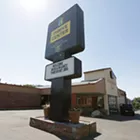Watching the snow dump on the East Coast over the weekend, you had to love New York City Mayor Michael Bloomberg urging calm and doling out cash his city doesn’t have while wearing his crisis-mode bomber jacket. He was the perfect disaster manager — the highest purpose our elected leaders can fulfill.
And it’s a job they’re all getting plenty of experience with, from Congress and the president desperately figuring out ways to save us from economic meltdown, to our state leaders trying to keep public education and social services alive, to local officials working to keep enough cops on the streets. Top to bottom, we’re trying to manage the disaster that is our economy.
You’d think by now it would be getting better, and in fact 2011 should be a solid year for American business — they enter the year with tax cuts in place and lots of cash on hand. But for state governments, 2011 will be painful. The stakes for the economy are high — more job cuts will add to unemployment, more cuts to social services will only deepen poverty and an anemic balance sheet could undercut the states’ ability to sell municipal bonds.
It’s ugly all over. In Illinois, state troopers have had their state credit cards rejected when they went to fill their cruisers because the state doesn’t pay its bills. In New Jersey, thousands of teachers have been laid off. In California, where they have a $19 billion shortfall, the state’s credit rating is teetering on junk status.
Here in Washington, our $1.1 billion shortfall has been cut in half by proposals put together in a recent special session; the remainder will have to be handled by the new session of the Legislature. But starting in July, for the 2011-13 budget, we’ve got another $4.6 billion disaster to manage.
How did we get here? States spent too much money over the years, made too many promises they can’t keep, and citizens continue to vote against spending. People want to keep their money and are apparently happy with fewer services. Now we’ll see what that really looks like.
Whatever the reasons, the disaster management ideas here are brutal — killing the State Tourism Office, which helps bring in $14 billion a year, removing another $100 million from public education and shuttering our beloved MAC. And there will be a lot more to come.
This is one mess you can’t clean up with snowplows and a cool leather jacket. But it will be riveting to watch.
Ted S. McGregor Jr. is the Editor and Publisher of The Inlander.

























